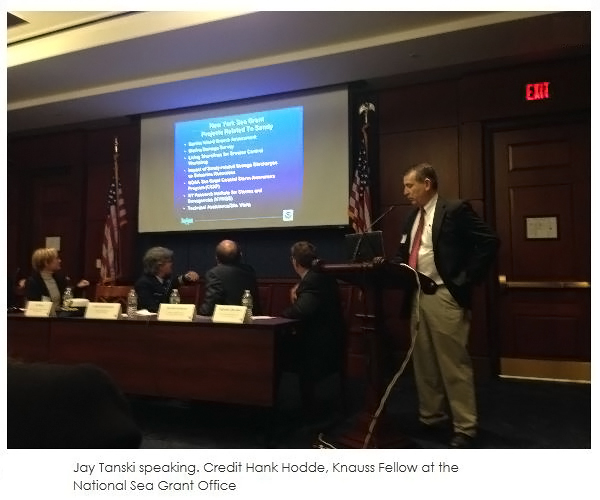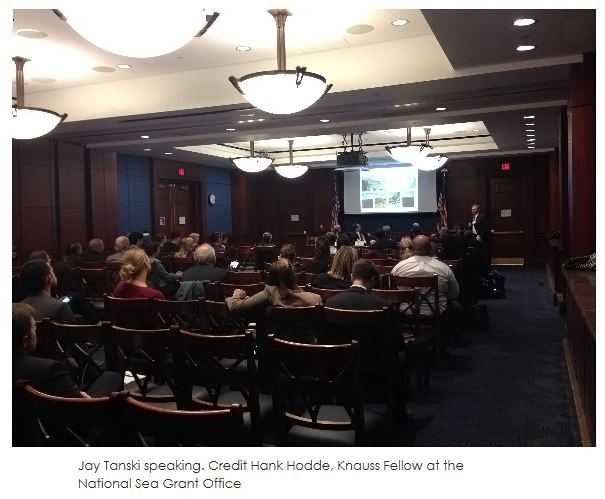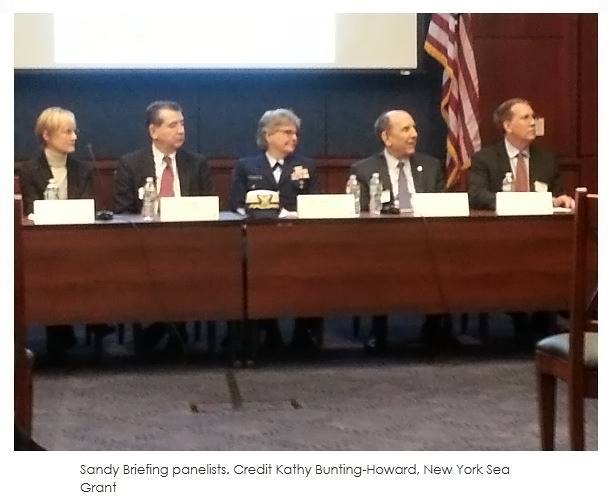NOAA's Role in Supporting Coastal Communities Before, During and After a Coastal Storm:
A Case Study of Hurricane Sandy
by Kathryn MacDonald, National Sea Grant College Program
Friday, November 22, 2013, Washington, DC - Staff and stakeholders of the National Oceanic and Atmospheric Administration (NOAA) held a congressional briefing on NOAA’s role in supporting coastal communities before, during, and after Sandy’s impact. The briefing took place on Wednesday November 20th, 2013, just weeks after the one year anniversary of the devastating coastal storm. Representatives from across the NOAA spectrum spoke discussing a wide range of issues including National Weather Service forecasting, National Marine Fisheries Service rapid fisheries stock assessment and the “boots on the ground” approach of New York Sea Grant. The talks highlighted best practices that helped communities and decision-makers during the difficult time leading up to and after Sandy, as well as the important lessons learned to prepare for future storms. The engaging presentations offered a succinct follow-up, summarizing NOAA’s overall response to Sandy.
Coastal Processes Specialist Jay Tanski was there representing New York Sea Grant, offering a perspective on how to implement NOAA-wide initiatives at the local level.

"In the briefing, Jay [Tanski] demonstrated Sea Grant’s added-value to the NOAA team through providing technical expertise and assisting agencies at the federal, State and local levels to connect with researchers in order to address the aftermath of Sandy," said Kathy Bunting-Howarth, New York Sea Grant Associate Director.
Tanski's presentation on the breach of Fire Island highlighted the permanence and relevance of the research that Sea Grant does every year. Back in 2001, New York Sea Grant-funded research modeled the possible effects of a breach on Fire Island. Because of this work, and their ongoing coordination with local stakeholders, Sea Grant was in a position to get that data into the hands of decision-makers after Sandy, and the community was able to make fast, informed choices about monitoring. While the impacts from the storm will be felt for years to come, the hard work and long-term investments in resiliency research and outreach by New York Sea Grant has helped communities become more resilient in the face of coastal hazards like Hurricane Sandy.

Overall, the presentations provided a concise overview of how NOAA and other federal agencies came together and coordinated efforts to respond to both immediate and long-term recovery efforts post-Sandy. New York Sea Grant’s response effort to Sandy isn't an isolated incidence, it is just one example of how the network was able to come together and help the people in our communities. Similar stories exist throughout the entire Sea Grant network.
Speakers included:
- Dr. Russell Callender, Deputy Assistant Administrator for the National Ocean Service
- Dr. Louis Uccellini, Assistant Administrator for the National Weather Service
- Commander Linda A. Sturgis, Senior Military Fellow, Center for a New American Security and former Chief, Prevention Department, USCG Sector New York
- Jay Tanski, New York Sea Grant Coastal Processes and Facilities Specialist
- Dr. Lisa Colburn, NOAA National Marine Fisheries Service, Northeast Fisheries Science Center
- Captain Alek Modjeski, AECOM, Water Natural Resources Director

Maine Beaches Conference
NYSG’s coastal processes specialist Jay Tanski a speaker at mid-July 2013's Maine Sea Grant-hosted event; Over 200 attend
Compiled by Paul C. Focazio, NYSG
The Maine Beaches Conference - held at Southern Maine Community College in South Portland, Maine - provided an opportunity for beach stakeholders with diverse interests — from surfers and business owners to beach monitoring programs and coastal managers — to share the most current information on erosion, weather and water quality at the State’s beaches, and the importance of tourism and property rights.
The effects of Superstorm Sandy was also a hot topic, as Tanski illustrated as a panelist as well as in discussions he and others in attendance had with local media (see YouTube clips below from ABC, NBC and CBS affiliates). Tanski told an Associated Press reporter that much of Sandy's destruction was caused by the storm's ocean surge, when rising seawater pushed by powerful winds came ashore and brought widespread flooding and destruction to New York and New Jersey last fall.
The first Maine Beaches Conference was held in 2000 and emerged from Sea
Grant-funded research by UMaine faculty Joseph Kelley and Daniel
Belknap who developed a volunteer beach erosion monitoring program in
response to recommendations of the Southern Maine Beach Stakeholder
Group, according to Catherine Schmitt, Maine Sea Grant communications
coordinator.
“Even in that first year, it was clear the interest in that information
extended far beyond the monitoring volunteers,” says conference
coordinator Kristen Grant, a marine extension associate with Maine Sea
Grant and University of Maine Cooperative Extension based at the Wells
National Estuarine Research Reserve. “Because beach stakeholders in
Maine represent a diverse range of interests, the conference has always
sought to provide continuing opportunities for communication and
exchange of the most current information among these stakeholders.”
Grant says participants continue to return to the conference because
they say it provides up-to-date information and many opportunities to
learn and network.
“They also appreciate the chance to meet resource people face-to-face,
the sharing of diverse perspectives and new ideas, and the
action-orientation of the conference,” Grant says.
In addition to NYSG's Tanski, representatives from several organizations
including the Maine Geological Survey, National Weather Service, Maine
Department of Environmental Protection, Maine Office of Tourism and
Maine Beaches Association presented during this year's sessions.
On YouTube: Maine Beach Conference: Lessons from Sandy's Destructive Path
(WCSH 6, a Portland, ME NBC Affiliate station)
It was standing room only during a panel discussion on lessons learned from Superstorm Sandy at the 13th annual Maine Beaches Conference at Southern Maine Community College.
"It might not happen in our lifetimes, I don't know that that is the new normal, but what I think is very important is to take a look at what worked, and what didn't work," stated Jay Tanski, a coastal geologist with the New York Sea Grant Program.
Tanski says Maine is ahead of other states because it already has a monitoring program to help develop understanding of what changes are occurring along our coastline.
He says officials at all levels of government need to be gathering information and making informed decisions with the data they are gathering.
"You have to be willing to change on the fly as you get more information," he said.
"You really have to look at the specific area and you really have to look ok, what do we want to do here, what are the objectives here, what are the forces that are acting on it, the flooding forces, the erosion, the wave forces and how is that shoreline responding?" he added.
Peter Slovinsky, a marine geologist with the Maine Geological Survey, says the areas impacted most by the storm share similar characteristics with the Pine Tree State.
"In New Jersey, just like in Maine, we have a lot of low lying areas," he explained. "We know some of these areas flood due to minimum events, so if you have a large event, they are going to flood just that much more."
He says more information is needed to develop more detailed planning documents and to improve our emergency response in the event of catastrophic storm.
"I think a lot of the lessons learned from what happened with Sandy are transferable to Maine," said Slovinsky. "Luckily, we have not had something like that happen here."
On YouTube: Maine Beaches Conference held in South Portland -
Conference focused on lessons learned from Superstorm Sandy
(WMTW 8, a Portland, ME ABC Affiliate station)
From scientists to beachgoers, hundreds of people attended Friday's 2013 Maine Beaches Conference to talk about what could happen to the state's beaches.
The daylong symposium was held at Southern Maine Community College, where the topics of tourism, erosion control and pollution were discussed.
Maine had multiple storms last year that took a toll on some beaches.
Storms such as Sandy and the blizzard caused beach erosion, damage and splashover.
National Weather Service experts said unusually warm water temperatures along the U.S. East Coast mean it's far more likely there will be hurricanes in the New England area.
NWS meteorologist John Cannon said one day, one of these storms is going to bring much more damage than we've seen before.
"One of these storms is going to line up right at the right tide cycle at a new moon or full moon. We already have very high water across the region. If you're bringing a big storm surge, you're bringing very large waves, strong winds and an intense nor'easter, that's when it's all going to happen. That's when we're going to have a big one," said Cannon.
So what can we do? Cannon said the NWS does all it can to warn people when storms are coming in, but finding a solution to erosion is a far more complicated issue.
On YouTube: Maine Beaches Conference held in South Portland
(WGME 13, a Portland, ME CBS Affiliate station)
Maine's beaches are a natural resource benefiting thousands of people in some way or the other, and on Friday, a conference to ensure those beaches remain pristine was held in South Portland. The conference aims to share information about how to help protect the shore including ways to battle erosion, and prepare for a large ocean storm like Superstorm Sandy.